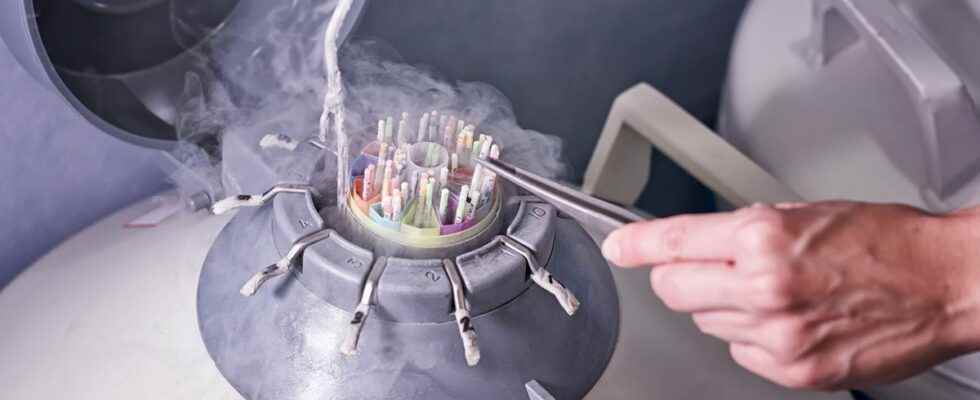Published on
Updated
Reading 2 mins.
in collaboration with
Dr Odile Bagot (Gynecologist-obstetrician)
Pregnancies resulting from in vitro fertilization (IVF) using frozen embryos have an increased risk of hypertensive complications compared to the use of fresh embryos or natural conception, according to the results of a large study examining the data from over four million pregnancies. The results were published in the American Heart Association’s journal Hypertension on September 26.
Data from over four million pregnancies
To arrive at these results, the researchers worked on data from 4.5 million pregnancies spread over 30 years and concentrated in three European countries: Sweden, Denmark and Norway.
The researchers analyzed medical birth registers from Denmark between the years 1994 and 2014, from Norway between the years 1984 and 2015, and from Sweden dated from 1985 to 2015. In total, the registers counted about 4.4 million naturally conceived pregnancies. , 78,300 pregnancies with fresh embryo transfer and 18,037 pregnancies with frozen embryo transfer.
Follow your pregnancy week by week
A higher risk of hypertension
According to the scientists’ conclusions, the chances of hypertensive disorders and premature births were slightly higher in pregnancies resulting from frozen embryos, compared to pregnancies following IVF without freezing or pregnancies following natural conception. . A risk that may be greater for hypertensive risks, according to the researchers, who believe that additional research, in the United States for example, is necessary to see if such results would be obtained.
Almost systematic freezing
Along with his findings, the study’s lead author, Dr. Sindre H. Petersen, a researcher at the Norwegian University of Science and Technology in Trondheim, Norway, states that “frozen embryo transfers are now becoming more common around the world, and in recent years some physicians have begun to skip fresh embryo transfer and routinely freeze all embryos in their clinical practice. And although most IVF pregnancies are healthy and uncomplicated, this study found that the risk of high blood pressure during pregnancy was significantly higher after frozen embryo transfer compared to pregnancies resulting from frozen embryo transfer. fresh embryo or of a natural conception “. For him, it is therefore necessary to weigh the benefit/risk for the future mother, before freezing an embryo.
A pathology in women?
Asked about this study, Dr. Odile Bagot, gynecologist and member of the Doctissimo expert committee, believes that the link between frozen embryo and high blood pressure during pregnancy cannot be established so directly.
“Already, the study dates back quite a long time and IVF techniques have changed in 30 years. Moreover, if these women received frozen embryos, it is because they have probably suffered failures during previous implantations. , which may be a sign of known or unknown vascular pathologies in them, which may explain the problems of hypertension during their pregnancy” concludes the specialist.
